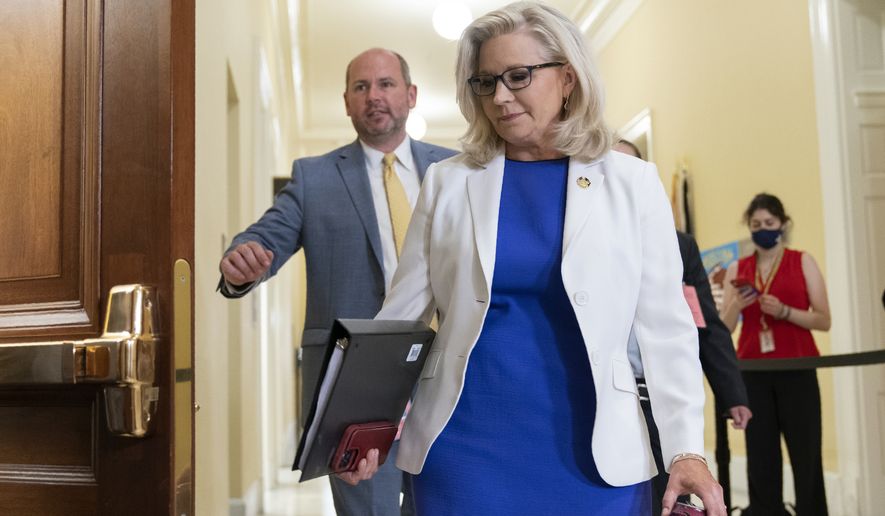The Jan. 6 committee said Thursday night it will hold more hearings in September, taking the divisive investigation into the 2021 pro-Trump riot at the U.S. Capitol deep into the midterm election season.
Rep. Liz Cheney of Wyoming, the top Republican on the panel, said more information has come to light, and the committee members plan to spend their August recess pursuing other avenues into the probe for their return in September.
“Our committee will spend August pursuing and merging information on multiple fronts before convening in September,” Ms. Cheney said at the start of the panel’s ninth public hearing.
Ms. Cheney added that the “dam has begun to break” in the probe into the riot by the panel, all of whose members were appointed by House Democrats.
Those upcoming hearings will come just ahead of the November midterms, in which Republicans are poised to do well.
Members held a prime-time hearing Thursday, focused on the inaction of former President Trump at the White House during 187 minutes while his supporters attacked the Capitol, trying to stop the certification of President Biden’s Electoral College victory.
“For 187 minutes on Jan. 6, this man of unbridled destructive energy could not be moved — not by his aides, not by his allies,” said Committee Chairman Bennie Thompson, Mississippi Democrat.
“Trump ignored the desperate pleas of his own family … even though he was the only person in the world who could call off the mob,” Mr. Thompson said via a remote link, as he is isolating while he recovers from COVID.
The two witnesses who testified in person Thursday were former Trump White House aides Matthew Pottinger, a top official at the National Security Council, and Sarah Matthews, a deputy press secretary.
They and other witnesses said Mr. Trump watched on TV with apparent satisfaction as his supporters stormed the Capitol, and balked for more than three hours at calling off the rioters.
The testimony also showed how Secret Service agents protecting Vice President Mike Pence at the Capitol feared for their lives, even calling family members in alarm during the riot.
Ms. Matthews, White House Counsel Pat Cipollone and others said they repeatedly advised that Mr. Trump should put out a statement telling the rioters to go home.
Ms. Matthews noted that the White House press room was just dozens of steps away from the presidential dining room where Mr. Trump was watching TV.
“He could have been on camera almost instantly,” she testified about the president.
Former deputy press secretary Judd Deere said in videotaped testimony that “I thought we needed to encourage individuals to stop, to respect law enforcement and to go home.”
Mr. Pottinger said he was “disturbed” when he saw a tweet by Mr. Trump saying that Mr. Pence “didn’t have the courage” to refuse to certify the Electoral College vote. He said he decided to resign at that moment.
“It was the opposite of what we needed, which was a de-escalation,” he said of Mr. Trump’s tweet against Mr. Pence.
Ms. Matthews said she viewed the tweet as the president “giving the green light” to escalate the violence at the Capitol.
“It was him pouring gasoline on the fire and making it much worse,” she testified.
Mr. Cipollone called it “a terrible tweet.”
Committee members said Mr. Trump refused for about three hours to call off the rioters because they were serving his selfish goal to remain in power.
“The mob was accomplishing President Trump’s purpose. So of course he did not intervene. He chose not to act,” said Rep. Adam Kinzinger, Illinois Republican.
Finally at 4:17 p.m., Mr. Trump tweeted a video of himself calling on the mob to “go home in peace.” He called his supporters “very special” but said violence would only “play into the hands” of Democrats whom he claimed stole the election.
A day later, Mr. Trump gave a speech from the White House condemning the “heinous attack” on the Capitol.
⦁ Dave Boyer contributed to this report.
• Joseph Clark can be reached at jclark@washingtontimes.com.
• Mica Soellner can be reached at msoellner@washingtontimes.com.




Please read our comment policy before commenting.